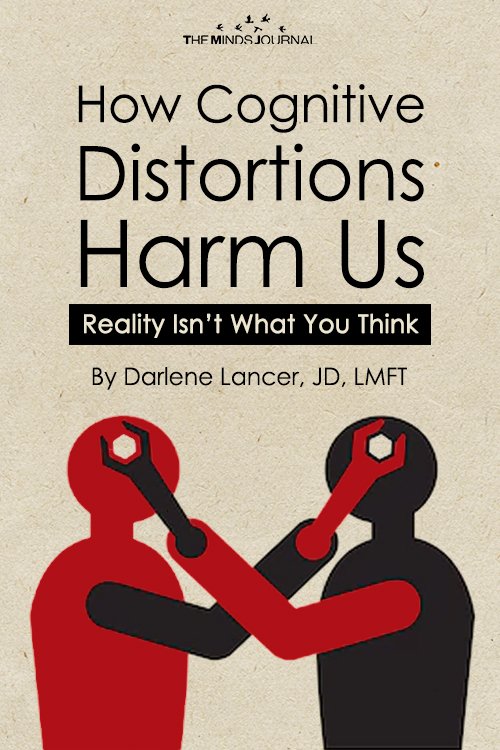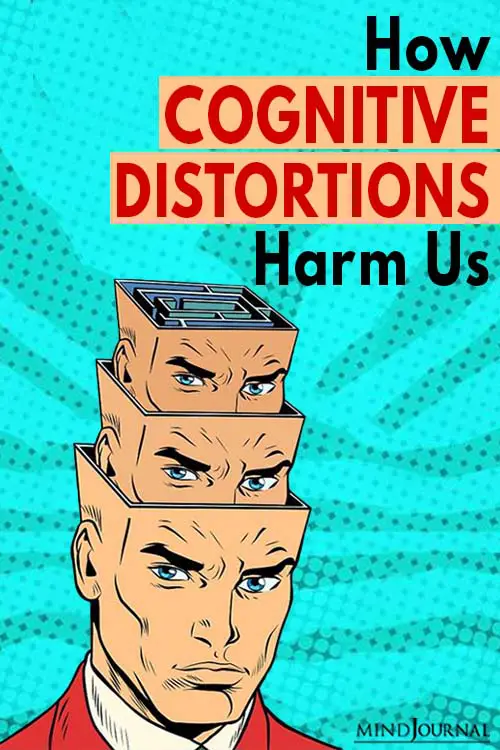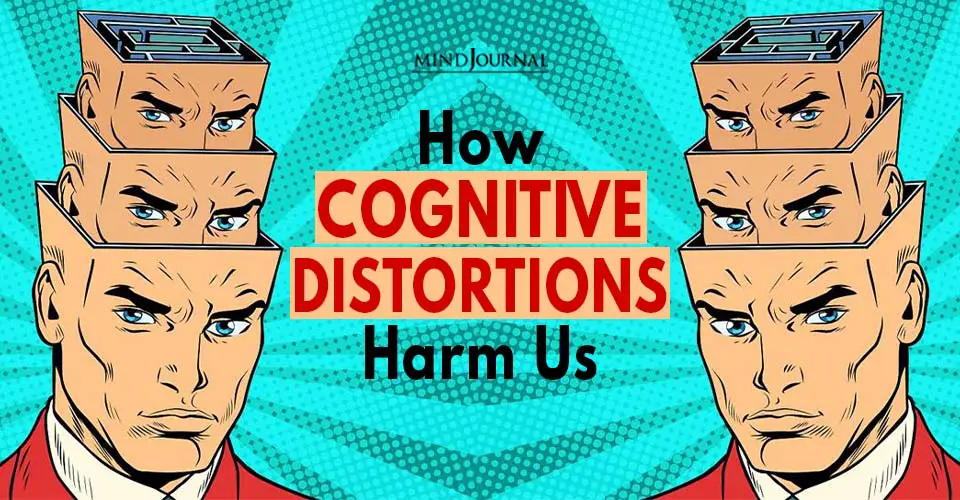We all see reality through a personal lens shaped by our beliefs, culture, religion, and experiences. The movie Roshomon was a brilliant example of this, where three witnesses to a crime recount different versions of what happened. When couples argue, they usually can’t agree on the facts of what happened. Additionally, our mind tricks us according to what we think, believe, and feel. These are cognitive distortions that cause us unnecessary pain.
If you suffer from anxiety, depression, low self-esteem, or perfectionism, your thinking can skew your perceptions.
Cognitive distortions reflect flawed thinking, often stemming from insecurity and low-self-esteem. Negative filters distort reality and can generate stressful emotions. Thoughts stir up feelings, which in turn trigger more negative thoughts, creating a negative feedback loop. If we act on our distorted perceptions, conflict ensues that can give rise to unintended negative consequences.
Cognitive Distortions
Being able to identify cognitive distortions builds our capacity to be mindful. Some are listed below:
• Negative filtering
• Magnification
• Labeling
• Personalization
• Black-and-white, all-or-nothing thinking
• Negative projections
• Overgeneralizing
Self-Criticism
Self-criticism is the most pernicious aspect of codependency and low self-esteem. It distorts reality and your perception of yourself. It can make you feel guilty, flawed, and inadequate. Negative self-talk robs you of happiness, make you miserable, and can lead to depression and illness. It leads to negative filtering, which itself is considered a cognitive distortion. Self-criticism produces to other distortions, such as magnification and labeling, when you call yourself an idiot, a failure, a jerk, for example. (For 10 specific strategies for working with the critic, see 10 Steps to Self-Esteem: The Ultimate Guide to Stop Self-Criticism.)
Shame underlies destructive or chronic self-criticism and causes many cognitive distortions. You might find fault with your thoughts, words, deeds, and appearance, and perceive yourself and events in a negative manner that no one else would. Some beautiful and successful people see themselves as unattractive, mediocre, or failures, and cannot be persuaded otherwise. (See Conquering Shame and Codependency: 8 Steps to Freeing the True You.)
Read 4 Kinds Of Self-Criticism You Must Put An End To
Magnification
Magnification is when we exaggerate our weaknesses or responsibilities. We can also inflate negative projections and potential risks. It’s also called catastrophizing because we’re “making mountains out of molehills” or “blowing things out of proportion.” The underlying assumption is we won’t be able to handle what will happen. It’s driven by insecurity and anxiety and escalates them.
Another distortion is minimization, when we downplay the importance of our attributes, skills, and positive thoughts, feelings, and events, such as compliments. We might magnify someone else’s looks or skills while minimizing our own. If you’re in a group sharing, you might think everyone’s pitch was better than your own. Stop comparing. It’s a self-shaming.
Personalization
Shame also underlies personalization. It’s when we take personal responsibility for things over which we have no control. We might also blame ourselves when anything bad happens as well as take the blame for things that happen to other people – even when it’s attributable to their own actions! We can end up always feeling guilty or like a victim.
If you’re plagued by guilt, it may be a symptom of toxic shame. Take steps to analyze and free yourself from guilt. (See Freedom from Guilt: Finding Self-Forgiveness.)
Read 10 Common Thinking Errors We Make Unknowingly
Black and White Thinking
Do you think in absolutes? Things are all-or-nothing. You’re the best or the worst, right or wrong, good or bad. When you say always or never, it’s a clue that you may be thinking in absolutes. This involves magnification. If one thing goes wrong, we feel defeated. Why bother? “If I can’t do my entire workout, there’s no point to exercise at all.” There’s no gray and no flexibility.
Life is not a dichotomy. There are always extenuating circumstances. Situations are unique. What applies in one instance may not be appropriate in another. An all-or-nothing attitude can cause you to overdo or miss out on opportunities to improve and gradually attain your goals––how the tortoise beat the hare.
Exercising for ten minutes or only some muscle groups have big health benefits, compared to doing nothing. There are health risks to overdoing, as well. If you believe you have to do everyone’s job, work overtime, and never ask for help, you will soon been drained, resentful, and eventually, ill.
Read Why Infidelity Isn’t Always Black And White As People Believe It To Be
Projecting the Negative
Self-criticism and shame generate anticipation of failure and rejection. Perfectionists also distort reality by assuming negative events or negative outcomes are more likely to occur than positive ones.
This creates tremendous anxiety about failing, making mistakes, and being judged. The future looms as a dangerous threat, rather than a safe arena to explore and enjoy our lives.
We may be projecting the unsafe home environment from our childhood and living as if it were happening now.
We need to recruit a loving parent within us to shine the light of consciousness on our fears and reassure ourselves that we’re no longer powerless, have choices, and that there’s nothing to fear.
Read How Healthy Thinking Techniques Can Help You Deal With Your Problems Better
Overgeneralizing
Overgeneralizations are opinions or statements that go beyond the truth or are broader than specific instances.
We might form a belief based on little evidence or only one example. We can jump from “Mary doesn’t like me,” to “Nobody likes me,” or “I’m not likeable.” When we generalize about a group of people or gender, it’s usually false.
For example, to say “Men are better at math than women,” is false because many women are better at math than many men are. When we use the words, “all” or “none,” “always” or “never,” we probably are making an overgeneralization, based on black-and-white thinking.
Another overgeneralization is when we project the past onto the future. “I haven’t met anyone dating online,” so, “I won’t ever,” or “You can’t meet anyone through online dating.”
Perfectionists tend to overgeneralize by making global, negative attributions about themselves and about their negative projections. When we don’t measure up to our rigid, unrealistic standards, we not only think the worst of ourselves, we expect the worst will happen.
If we spill our water at a dinner party, it’s not just an embarrassing accident; we’re mortified, and certainly, we made a clumsy fool of ourselves. We go one step further with a negative, projection and overgeneralize to imagine that everyone thinks the same, won’t like us, and won’t invite us again
©Darlene Lancer 2017
Written by Darlene Lancer, JD, LMFT
Originally appeared on WhatIsCodependency.Com










Leave a Reply
You must be logged in to post a comment.